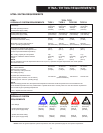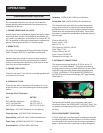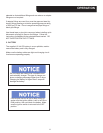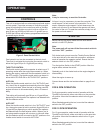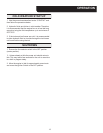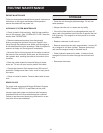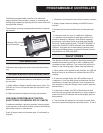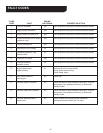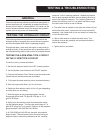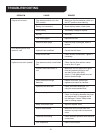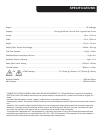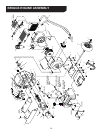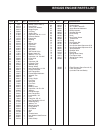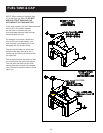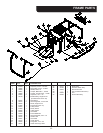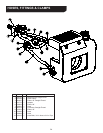
17
GENERAL
Tests and adjustments should be performed periodically to
ensure the power unit is operating at maximum efciency.
Stanley Circuit Tester is recommended. This tester can be
used to isolate problems in both the engine and hydraulic
system prior to any power unit disassembly.
TESTING THE HYDRAULIC CIRCUIT
The following tests can be performed to ensure that the
hydraulic pump is supplying the correct ow and pressure
and that the system relief valve is operating properly.
During these tests, make sure the engine is warm and op-
erating smoothly. If test results are not as specied, refer to
the troubleshooting table in this section for possible causes.
TESTING THE 8 GPM HTMA TYPE II CIRCUIT
OR THE 12 GPM TYPE III CIRCUIT
To test the circuit, proceed as follows:
1. Set the ow selector switch to the OFF (center) position.
2. Set the throttle control switch to AUTO-OFF position.
3. Connect the Stanley Circuit Tester across two hose ends
(where the tool would normally be connected).
4. Fully open the tester restrictor valve (counterclockwise).
5. Start the engine and allow it to run until warm.
6. Switch the ow selector switch to 8 or 12 gpm depending
on which ow you are testing.
7. With the engine at the programed speed, the test
ow gauge should read 7-9 gpm/26.5-34 lpm or 11-13
gpm/41.6-49 lpm.
8. Slowly turn the restrictor valve clockwise while watch-
ing the pressure gauge. The ow rate should stay at 7-9
gpm/26.5-34 lpm or 11-13 gpm/41.6-49 lpm as the pressure
gauge reaches 2100-2200 psi/148-155 bar.
9. At 2100-2200 psi/148-155 bar, the relief valve should
begin to open. The pressure at which the relief valve just
begins to open is commonly referred to as the "cracking
pressure". At the "cracking pressure," the ow rate should
start to drop because the relief valve is allowing uid to by-
pass to the hydraulic reservoir. The "cracking pressure" is
preset at the factory and if it is not within the above range,
the relief valve must be re-set as follows:
a. The relief valve is located on the right side of the unit just
behind the dash panel. It protrudes out from the manifold
assembly. Use a open end or box end wrench to loosen the
nut on the relief valve.
b. Use an Allen wrench to adjust the relief valve. Turn
clockwise to raise the pressure and counterclockwise to
reduce the pressure.
c. Tighten the nut and retest.
TESTING & TROUBLESHOOTING



